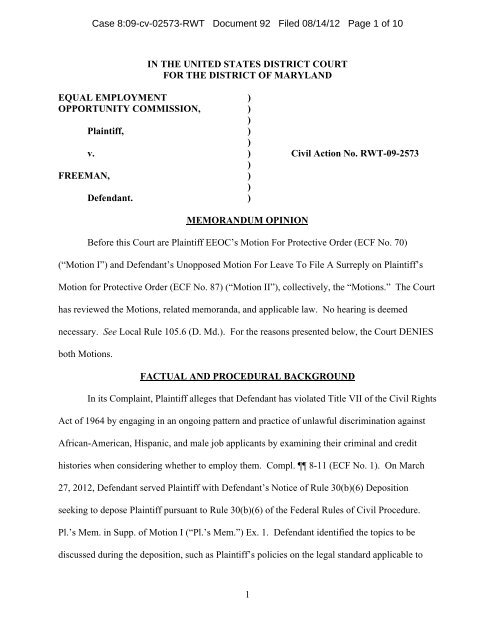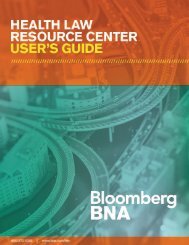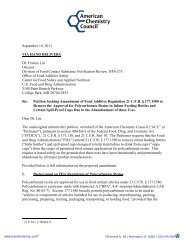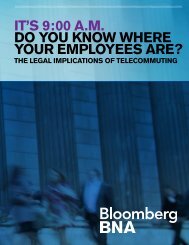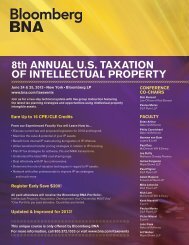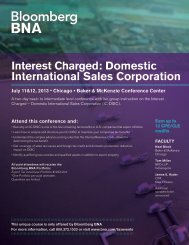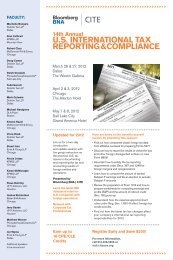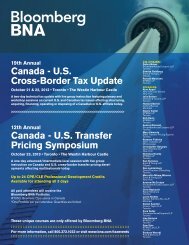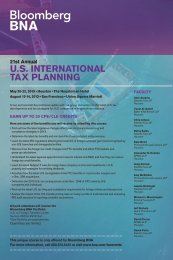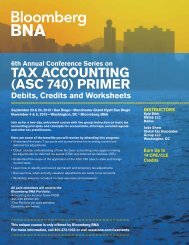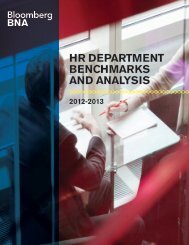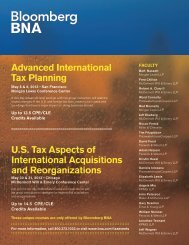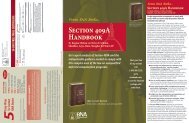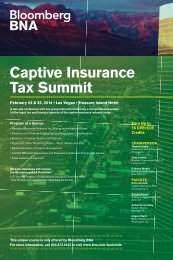Case - Workplace Class Action Blog
Case - Workplace Class Action Blog
Case - Workplace Class Action Blog
- No tags were found...
Create successful ePaper yourself
Turn your PDF publications into a flip-book with our unique Google optimized e-Paper software.
<strong>Case</strong> 8:09-cv-02573-RWT Document 92 Filed 08/14/12 Page 1 of 10<br />
IN THE UNITED STATES DISTRICT COURT<br />
FOR THE DISTRICT OF MARYLAND<br />
EQUAL EMPLOYMENT )<br />
OPPORTUNITY COMMISSION, )<br />
)<br />
Plaintiff, )<br />
)<br />
v. ) Civil <strong>Action</strong> No. RWT-09-2573<br />
)<br />
FREEMAN, )<br />
)<br />
Defendant. )<br />
MEMORANDUM OPINION<br />
Before this Court are Plaintiff EEOC’s Motion For Protective Order (ECF No. 70)<br />
(“Motion I”) and Defendant’s Unopposed Motion For Leave To File A Surreply on Plaintiff’s<br />
Motion for Protective Order (ECF No. 87) (“Motion II”), collectively, the “Motions.” The Court<br />
has reviewed the Motions, related memoranda, and applicable law. No hearing is deemed<br />
necessary. See Local Rule 105.6 (D. Md.). For the reasons presented below, the Court DENIES<br />
both Motions.<br />
FACTUAL AND PROCEDURAL BACKGROUND<br />
In its Complaint, Plaintiff alleges that Defendant has violated Title VII of the Civil Rights<br />
Act of 1964 by engaging in an ongoing pattern and practice of unlawful discrimination against<br />
African-American, Hispanic, and male job applicants by examining their criminal and credit<br />
histories when considering whether to employ them. Compl. 8-11 (ECF No. 1). On March<br />
27, 2012, Defendant served Plaintiff with Defendant’s Notice of Rule 30(b)(6) Deposition<br />
seeking to depose Plaintiff pursuant to Rule 30(b)(6) of the Federal Rules of Civil Procedure.<br />
Pl.’s Mem. in Supp. of Motion I (“Pl.’s Mem.”) Ex. 1. Defendant identified the topics to be<br />
discussed during the deposition, such as Plaintiff’s policies on the legal standard applicable to<br />
1
<strong>Case</strong> 8:09-cv-02573-RWT Document 92 Filed 08/14/12 Page 2 of 10<br />
challenging an employer’s use of credit history or arrest records in hiring; Plaintiff’s policies on<br />
and justifications for considering arrest and credit records in hiring; and certain EEOC<br />
adjudicative procedures used during the “credentialing and suitability decision making process.”<br />
Id. In response, Plaintiff seeks a protective order. Motion I 1.<br />
DISCUSSION<br />
Rule 26(b)(1) of the Federal Rules of Civil Procedure states, “[p]arties may obtain<br />
discovery regarding any nonprivileged matter that is relevant to any party’s claim or defense.”<br />
Fed. R. Civ. P. 26(b)(1). The relevance standard addresses “concerns about the overbreadth and<br />
expense of discovery,” and, thus, “restrict[s] the scope of discovery to unprivileged facts relevant<br />
to ‘the claim or defense of any party’, unless the court determines that there is ‘good cause’ to<br />
permit broader discovery relevant to the subject matter of the action, but not more directly<br />
connected to the particular claims and defenses.” Thompson v. Dep’t of Hous. & Urban Dev.,<br />
199 F.R.D. 168, 171 (D. Md. 2001).<br />
Generally, motions for protective orders “seeking to prevent the taking of a deposition<br />
[are] regarded unfavorably by the courts.” Minter v. Wells Fargo Bank, N.A., 258 F.R.D. 118,<br />
125 (D. Md. 2009). Such orders “should rarely be granted absent extraordinary circumstances;”<br />
therefore, the moving party bears a “heavy burden.” Id. (quoting Static Control Components,<br />
Inc. v. Darkprint Imaging, 201 F.R.D. 431, 434 (M.D.N.C. 2001)) (internal quotation marks<br />
omitted).<br />
Here, Plaintiff argues that the Court should issue a protective order preventing a 30(b)(6)<br />
deposition of Plaintiff for three reasons. First, Plaintiff contends that a protective order is<br />
appropriate because the deposition would not seek information relevant to any claim or defense.<br />
Pl.’s Mem. 4-14, 16-19, 20-23. Second, Plaintiff argues that the deposition would not disclose<br />
2
<strong>Case</strong> 8:09-cv-02573-RWT Document 92 Filed 08/14/12 Page 3 of 10<br />
any relevant information because Plaintiff does not choose or conduct all of its hiring practices.<br />
Pl.’s Mem. 14-16. Third, Plaintiff argues that the Court should issue a protective order because<br />
the deposition would be cumulative, burdensome, and duplicative of publicly available<br />
information. Pl.’s Mem. 19, 24-25. Each of these arguments fails to support a protective order.<br />
The Court will address each in turn below.<br />
I. The Deposition Seeks Information Relevant to Defenses in this <strong>Case</strong><br />
Plaintiff argues that Defendant’s 30(b)(6) deposition would not discover information<br />
relevant to the claims and defenses in this case because: (1) Defendant has not pled an equitable<br />
estoppel defense, see Pl.’s Mem. 4-5; and (2) Defendant’s business necessity defense lacks merit,<br />
see generally Pl.’s Mem. 5-23. The Court agrees in part.<br />
Defendant cannot discover information relevant to an affirmative defense that Defendant<br />
has not pled. According to Rule (8)(c)(1) of the Federal Rules of Civil Procedure, “[i]n<br />
responding to a pleading a party must affirmatively state any . . . affirmative defense, including: .<br />
. . estoppel.” Fed. R. Civ. P. 8(c)(1). Defendant did not plead an affirmative defense of<br />
equitable estoppel in its Answer. See Answer (ECF No. 8). Defendant claims that it can move<br />
to amend its Answer under Rule 15 of the Federal Rules of Civil Procedure. Def.’s Opp’n 22.<br />
However, Defendant has not yet filed such a motion. Because Defendant failed to include<br />
equitable estoppel as an affirmative defense in its Answer and has not yet obtained leave to<br />
amend its Answer to include this defense, discovery of matters relating to this affirmative<br />
defense are not relevant, and Defendant cannot depose Plaintiff on topics related to this defense.<br />
Plaintiff, however, cannot avoid a deposition because it believes that Defendant’s<br />
business necessity defense is baseless. Arguments regarding the merits of claims or defenses<br />
asserted in pleadings “[are] not the kind[s] of argument[s] that the Court can adequately entertain<br />
3
<strong>Case</strong> 8:09-cv-02573-RWT Document 92 Filed 08/14/12 Page 4 of 10<br />
in a discovery dispute.” Drexel Heritage Furnishings, Inc. v. Furniture USA, Inc., 200 F.R.D.<br />
255, 257 (M.D.N.C. 2001); see also Triangle Residential Designs, Inc. v. Ashley Turner Enters.,<br />
Inc., No. 5:05-CV-412-F(3), 2011 WL 7293428, at *2 (E.D.N.C. Feb. 24, 2011) (holding that<br />
“[a]rguments that Plaintiff’s claims have no merit or that Defendants have a viable affirmative<br />
defense are not ‘the kind of argument[s] that the Court can adequately entertain in a discovery<br />
dispute.’” (second alteration in original) (citation omitted)).<br />
Instead of evaluating Defendant’s business necessity defense at this stage, the Court must<br />
determine whether the deposition seeks information relevant to that defense or reasonably<br />
calculated to lead to the discovery of admissible evidence. Plaintiff claims that Plaintiff’s use of<br />
credit and criminal histories is not relevant because a business necessity defense “is employerand<br />
job-specific,” and Defendant is the employer in question. Pl.’s Mem. 6. However, if<br />
Plaintiff uses hiring practices similar to those used by Defendant, this fact may show the<br />
appropriateness of those practices, particularly because Plaintiff is the agency fighting unfair<br />
hiring practices. See EEOC v. Kaplan Higher Educ. Corp., No. 1:10 CV 2882, 2011 WL<br />
2115878, at *4 (N.D. Ohio May 27, 2011) (“Whether the EEOC uses background or credit<br />
checks in hiring its employees is relevant to whether such measures are a business necessity.<br />
Accordingly, defendant is entitled to depose [EEOC’s] Rule 30(b)(6) designee on these topics.”).<br />
Plaintiff and Defendant consider similar factors in evaluating individuals with a criminal<br />
background, such as the “nature of the offense” committed, the “seriousness of the conduct,” and<br />
the position to be filled. Compare Def.’s Opp’n 10 (discussing various factors analyzed during<br />
the hiring process when an individual has a criminal record) and Def.’s Opp’n Koerner Decl. at<br />
Ex. K at 176 (same), with Pl’s Mem. 20-23 (outlining the procedures and processes used in<br />
hiring individuals with criminal records). Plaintiff’s practices are therefore reasonably calculated<br />
4
<strong>Case</strong> 8:09-cv-02573-RWT Document 92 Filed 08/14/12 Page 5 of 10<br />
to lead to the discovery of admissible evidence, even if these practices eventually may not be<br />
admissible at trial or ultimately dispositive to showing whether Defendant violated the law.<br />
Further, Defendant is not required to accept Plaintiff’s position in its briefs that the two entities’<br />
practices are dissimilar – Defendant is entitled to discovery on this issue as it relates to<br />
Defendant’s defense.<br />
The cases to which Plaintiff cites do not convince the Court that Plaintiff’s hiring<br />
practices are irrelevant, particularly given that all but one are not binding law in this circuit.<br />
Some do not discuss discovery issues. See, e.g., Johnson v. Mayor & City Council of Baltimore,<br />
472 U.S. 353 (1985) (on appeal of a Fourth Circuit decision to reverse a bench verdict, the<br />
Supreme Court addresses whether a federal retirement provision articulates a bona fide<br />
occupational qualification for firefighters); EEOC v. Illinois, No. 86 C 7214, 1991 WL 259027<br />
(N.D. Ill. Nov. 29, 1991) (in denying a motion for summary judgment, ruling that Defendant<br />
cannot rely on a federal age requirement in defending against an age discrimination claim);<br />
United States v. New York, 475 F. Supp. 1103 (N.D.N.Y. 1979) (ruling on a disparate impact<br />
case after trial). Other cases cited by Plaintiff do not address discovery of government practices,<br />
and so are distinguishable. See, e.g., United States ex rel. Singh v. Bradford Reg’l Med. Ctr., 249<br />
F.R.D. 220 (W.D. Pa. 2008); MCI Worldcom Network Servs., Inc. v. Von Behren Electric, Inc.,<br />
No. Civ. A. 1:00CV3311JTC, 2002 WL 32166535 (N.D. Ga. May 21, 2002).<br />
United States v. N.Y. Metro. Transp. Auth., No. CV 2004-4237 (SLT) (MDG), 2006 WL<br />
708672 (E.D.N.Y. Jan. 12, 2006) is also distinguishable. In that case, the Eastern District of<br />
New York deemed irrelevant the government’s religious accommodations because the defendant<br />
did not show factual similarities between it and the government agency, and the information was<br />
not related to any other defense. Id. Here, Defendant has pointed to similarities between<br />
5
<strong>Case</strong> 8:09-cv-02573-RWT Document 92 Filed 08/14/12 Page 6 of 10<br />
Plaintiff’s and Defendant’s hiring practices, and the information at issue is related to Defendant’s<br />
business necessity defense. See Def.’s Opp’n 8-10. Further, the Court is reluctant to rely on the<br />
unpublished decision of the District of Nebraska disallowing deposition testimony of EEOC<br />
policy in a religious discrimination case because the decision does not sufficiently explain why<br />
the deposition would seek irrelevant information, and the case involved a different underlying<br />
claim. See EEOC v. JBS USA, LLC, No. 8:10cv318, 2012 WL 169981 (D. Neb. Jan. 19, 2012).<br />
II.<br />
Plaintiff Cannot Avoid a Deposition Because the Office of Personnel Management<br />
(“OPM”) Aids Plaintiff with Its Hiring Process<br />
Plaintiff asserts that the Court should prohibit Defendant from taking a Rule 30(b)(6)<br />
deposition regarding Plaintiff’s hiring procedures because Plaintiff does not formulate or conduct<br />
all of these hiring procedures. Pl.’s Mem. 14-16. Plaintiff states that “EEOC is subject to the<br />
requirements of 5 C.F.R. § 731, an OPM regulation that mandates” a particular hiring process.<br />
Id. Plaintiff further explains that it “does not conduct suitability investigations” during the hiring<br />
process – rather, agents of OPM conduct these investigations – and Plaintiff has “no authority to<br />
make suitability determinations.” Pl.’s Mem. 14-15, see also Pl.’s Mem. Ex. 3 at 85-86, 124-25,<br />
129-30, 161-62. However, Plaintiff does play a role in the process and seems to make the final<br />
determination as to whether an individual will be offered employment or remain employed by<br />
Plaintiff. Def.’s Opp’n Koerner Decl. at Ex. G at 89-92, 111-14, 134-35, 145-46, 163; see also<br />
id. at Koerner Decl. at Ex. O at 3 (Plaintiff’s human resources department also creates and<br />
maintains appropriate suitability and personnel investigation programs for covered positions to<br />
“ensure that the employment of each person will promote the efficiency of the service.”). Thus,<br />
even if Plaintiff uses OPM’s federally mandated procedures, the facts show that Plaintiff is<br />
involved in the hiring process, and so Defendant’s 30(b)(6) deposition of Plaintiff regarding its<br />
actual involvement in that process and the process itself would provide relevant information.<br />
6
<strong>Case</strong> 8:09-cv-02573-RWT Document 92 Filed 08/14/12 Page 7 of 10<br />
III.<br />
A Protective Order is Not Appropriate under Rule 26(b)(2)(C)<br />
Finally, Plaintiff argues that because a 30(b)(6) deposition would be “unduly<br />
burdensome, duplicative and interfere with agency functioning,” Plaintiff should not have to<br />
submit to the deposition under Rule 26(b)(2)(C). Pl.’s Mem. 3. Rule 26(b)(2)(C) of the Federal<br />
Rules of Civil Procedure states that a court must limit discovery if<br />
(i)<br />
(ii)<br />
(iii)<br />
the discovery sought is unreasonably cumulative or<br />
duplicative, or can be obtained from some other source that<br />
is more convenient, less burdensome, or less expensive;<br />
the party seeking discovery has had ample opportunity to<br />
obtain the information by discovery in the action; or<br />
the burden or expense of the proposed discovery outweighs<br />
its likely benefit, considering the needs of the case, the<br />
amount in controversy, the parties’ resources, the<br />
importance of the issues at stake in the action, and the<br />
importance of the discovery in resolving the issues.<br />
Fed R. Civ. P. 26(b)(2)(C). Thus, under this rule, “the simple fact that requested information is<br />
discoverable under Rule 26(a) does not mean that discovery must be had.” Nicholas v.<br />
Wyndham Int’l, Inc., 373 F.3d 537, 543 (4th Cir. 2004).<br />
Plaintiff argues that allowing Defendant to take a 30(b)(6) deposition of Plaintiff would<br />
be duplicative under Rule 26(b)(2)(C) because Plaintiff was deposed on similar issues in 2011 in<br />
another case – EEOC v. Kaplan Higher Educ. Corp., No. 1:10 CV 2882, (N.D. Ohio) – “and the<br />
transcript of that deposition is now a matter of public record.” Pl.’s Mem. 19. However,<br />
Defendant did not participate in that deposition, and Defendant should not be required to rely on<br />
another party’s deposition of Plaintiff in a different case in formulating a defense in this case.<br />
Further, the record does not show that the deposition in Kaplan covered all of the same topics<br />
that Defendant seeks to cover in its deposition of Plaintiff. Compare Kaplan, 2011 WL<br />
2115878, at *1-2 (listing deposition topics, including EEOC’s use of credit histories and<br />
7
<strong>Case</strong> 8:09-cv-02573-RWT Document 92 Filed 08/14/12 Page 8 of 10<br />
background checks in its hiring practices and the policies behind the use of that information) and<br />
Def.’s Opp’n Koerner Decl. at Ex. G at 24-26 (showing that EEOC declined to provide<br />
testimony on use of criminal histories in hiring during the Kaplan deposition) with Pl.’s Mem.,<br />
Ex. 1 (listing deposition topics, including Plaintiff’s use of credit histories and criminal histories<br />
in its hiring process). Hence, Plaintiff has not met its burden to show that this deposition would<br />
be duplicative under Rule 26(b)(2)(C)(i).<br />
Similarly, the Court is not convinced that a protective order is appropriate because,<br />
purportedly, “information about the federal government’s suitability procedures and criteria as<br />
they relate to criminal history is already publicly available in the Code of Federal Regulations,”<br />
as is other policy guidance on the “‘legal standard’ applicable to Title VII cases challenging an<br />
employer’s use of credit or criminal history as a selection procedure.” Pl.’s Mem. 23-25. Again,<br />
Defendant is entitled to depose Plaintiff on topics relevant to claims and defenses in this case,<br />
and is not required to rely only on Plaintiff’s public statements. Additionally, Defendant seeks to<br />
question Plaintiff regarding topics not necessarily discussed in the public domain, such as<br />
information regarding the extent to which Plaintiff relies on a particular OPM memorandum “in<br />
determining credentialing, suitability, and security clearance decision-making for [Plaintiff’s]<br />
employees, applicants, and contractors;” and information relating to Plaintiff’s adjudicative<br />
procedures for evaluating the criminal histories and financial records of applicants, employees,<br />
and contractors. Pl.’s Mem. Ex. 1. Although not raised by Plaintiff, to the extent that Defendant<br />
seeks to discover Plaintiff’s non-public legal interpretations or other privileged information,<br />
Plaintiff can object on the record during the deposition. See, e.g., Greene v. Thalhimer’s Dep’t<br />
Store, 93 F.R.D. 657, 659 (E.D. Va. 1982) (describing the rules governing the common-law<br />
8
<strong>Case</strong> 8:09-cv-02573-RWT Document 92 Filed 08/14/12 Page 9 of 10<br />
executive privilege); see also Jones v. Murphy, 256 F.R.D. 510, 515 n.5 (D. Md. 2008) (citing to<br />
Greene as a source on the federal law of executive privilege).<br />
Additionally, Plaintiff has not shown that the burden of allowing Defendant to take a<br />
30(b)(6) deposition of Plaintiff would “outweigh[] its likely benefit, considering the needs of the<br />
case, the amount in controversy, the parties’ resources, the importance of the issues at stake in<br />
the action, and the importance of the discovery in resolving the issues.” Fed. R. Civ. P.<br />
(26)(b)(2)(C)(iii). When a “party claim[s] that a discovery request is unduly burdensome,” that<br />
party “must allege specific facts that indicate the nature and extent of the burden, usually by<br />
affidavits or other reliable evidence. A conclusory assertion of burden and expense is not<br />
enough.” Tucker v. Ohtsu Tire & Rubber Co., Ltd., 191 F.R.D. 495, 498 (D. Md. 2000)<br />
(citations omitted); see also EEOC v. McCormick & Schmick’s Seafood Rests., No. DKC-11-<br />
2695, 2012 WL 2577795 (D. Md. July 2, 2012) (requiring defendant to respond to discovery at<br />
issue in part because it failed to provide evidence of any actual burden that responding would<br />
impose). Rather than offering specific reasons or evidence as to why a 30(b)(6) deposition<br />
would impose undue burden, Plaintiff provides “conclusory assertion[s] of burden,” Tucker, 191<br />
F.R.D. at 498 – that deposing Plaintiff “would be unduly burdensome, . . . and interfere with<br />
agency functioning.” Pl.’s Mem. 3, 14, 19, 20. This argument is insufficient to avoid a<br />
deposition under Rule 26(b)(2)(C).<br />
9
<strong>Case</strong> 8:09-cv-02573-RWT Document 92 Filed 08/14/12 Page 10 of 10<br />
CONCLUSION<br />
Based on the foregoing, the Court DENIES Motion I. The Court additionally DENIES<br />
Motion II. Under Local Rule 105.2(a), “[u]nless otherwise ordered by the Court, surreply<br />
memoranda are not permitted to be filed.” Local Rule 105.2(a). A surreply “may be permitted<br />
when the moving party would be unable to contest matters presented to the court for the first<br />
time in the opposing party’s reply.” Khoury v. Meserve, 268 F. Supp. 2d 600, 605 (D. Md. 2003)<br />
(citation omitted). In this case, Plaintiff did not raise any new matters in its Reply. Rather,<br />
Plaintiff merely addresses issues that it previously discussed. Because Plaintiff’s Reply fails to<br />
raise any new issues, the Defendant does not need an opportunity to respond, and Motion II is<br />
denied.<br />
August 14, 2012<br />
/s/<br />
Charles B. Day<br />
United States Magistrate Judge<br />
CBD/mkh/hms<br />
10


